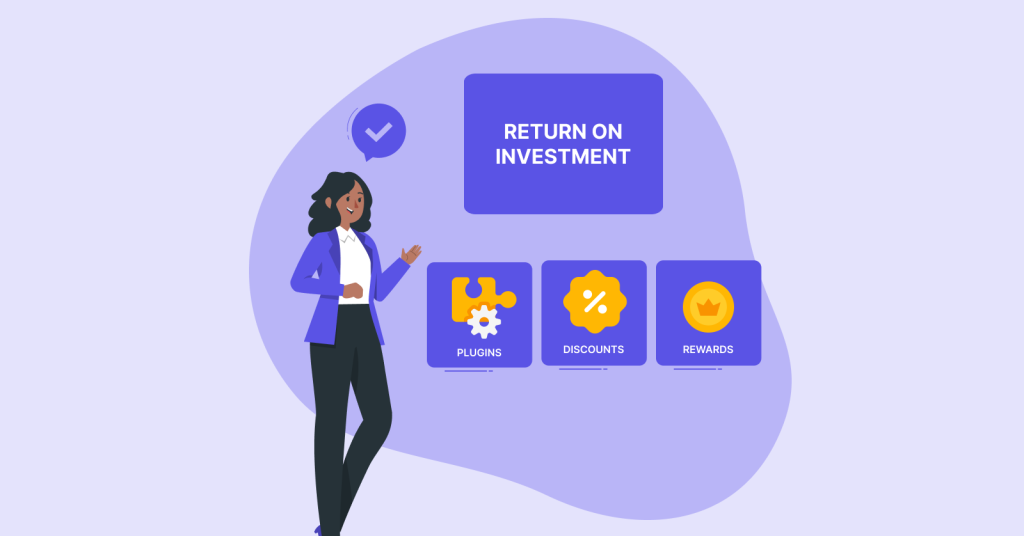With ‘zero’ ad spend, you can acquire new customers, and ensure long-term profits in your WooCommerce store just by making sure your referral program succeeds. Referral program success can unlock a flywheel of growth that can take your WooCommerce store to the next level.
Referral marketing leverages your existing customer base to bring in new ones. It’s the digital version of word-of-mouth but supercharged with tools, incentives, and performance metrics. When you measure Referral Program Success, you’re not just validating your strategy—you’re refining your growth engine. It’s the key to understanding whether your WooCommerce referral system is truly paying off.
In this blog, we’ll cover the exact metrics you need to track, the tools (like WPLoyalty) that help you do it right, and advanced optimization tactics to squeeze every ounce of value from your referral campaigns.
Encourage repeat purchases by offering reward points to customers who refer your products using the WPLoyalty plugin.
Why Measuring Referral Program Success Matters
Running a referral campaign without metrics is like sailing without a compass. Measuring Referral Program Success ensures your WooCommerce affiliate program drives results, not just buzz. You gain clarity on customer acquisition, conversion rate, and return on investment (ROI), helping fine-tune both referral incentives and your overall strategy.
Key Metrics to Track
Understanding which metrics to track is vital for Referral Program Success. These metrics reveal your campaign’s performance across every touchpoint, from awareness to retention.
1. Conversion Rate
The conversion rate shows the percentage of referred users who complete a desired action, typically a purchase. It reflects how compelling your offer is, how trustworthy the referrer appears to the new user, and how smooth your referral flow is. Aim for a seamless experience—from the referral link to checkout for referral program success.
If your WooCommerce referral program conversion rates are low, test different incentives. Try offering higher-value discount coupons or reward tiers using WPLoyalty’s built-in A/B testing capabilities.
Bonus Read! How to Reduce Customer Acquisition Cost: 12 Ways
2. Click-Through Rate (CTR)
The click-through rate measures how many users click on the referral link. It shows how engaging your emails, banners, or messages are. A strong CTR suggests your referral message is persuasive and well-placed.

Improve CTR by experimenting with referral link placements in post-purchase emails, thank-you pages, or SMS campaigns for referral program success.
3. Average Order Value (AOV)
Average order value tells you how much revenue referred customers generate per transaction. A high AOV indicates quality leads. You can nudge it higher with upsells or bundling products.
Track this using analytics tools and WPLoyalty’s dashboard. You can also offer bonus points for referred users who hit spending milestones.
Increase the average order value of your WooCommerce store by offering discounts based on customers’ purchase value using the WPLoyalty plugin.
4. Customer Lifetime Value (CLV)
Customer lifetime value helps you understand how much profit a referred customer brings over time. Are they loyal? Do they return often? If your CLV for referred customers is higher than other segments, your referral program is working.
You can also set up a tiered loyalty program in WooCommerce using WPLoyalty and segment customers to nurture high-CLV customers.
5. Return on Investment (ROI)

ROI is the ultimate metric to measure the referral program’s success. It compares your revenue from referrals against your campaign costs—plugin fees, discounts, and rewards. A high ROI signals a scalable program.
Calculate Loyalty Program ROI monthly and adjust budgets, rewards, and messages to continuously improve affiliate program performance.
Bonus Read! Key KPIs to Track the Success of Your Loyalty Program
Tools for Referral Program Analytics
To effectively track and optimize Referral Program Success, you need tools that offer real-time insights and actionable data. Here are some of the best options:
1. WPLoyalty
One of the most powerful tools for WooCommerce referral systems, WPLoyalty makes it easy to create a referral program in WooCommerce, and also track it for future optimizations. Features include:
- Visual performance dashboard for conversion rate, CLV, CTR, and more
- Referral program analytics tools with deep segmentation
- Reward configuration (loyalty points, discount coupons, free products)
- Multi-level referral program setup and automation
- Referral program tracking plugins that sync with WooCommerce orders to measure referral program success.
2. Google Analytics
Use UTM-tagged referral links to track referral sources and behavior. Analyze click-through rate, bounce rate, and revenue per visitor. Combine with WPLoyalty data for a fuller picture.
3. Plugin-Specific Dashboards
WooCommerce referral plugin dashboards, such as the one in WPLoyalty, provide quick access to key performance indicators (KPIs) including customer acquisition cost, payout system history, and referral program performance metrics.
4. Performance Dashboards and Heatmaps
Use tools like Hotjar or Microsoft Clarity to see where users engage most with referral CTAs. This helps improve UX and boost the click-through rate.
5. CRM + Email Tools
Track and measure referral flows triggered via email, WhatsApp, or SMS. Sync with tools like Klaviyo, Retainful, or MailPoet to attribute conversions back to referral links.
Setting Up and Tracking Referral Campaigns
Setting up a WooCommerce referral program properly is key to achieving consistent results. Here’s how to do it:
1. Install a Referral Program Plugin
Choose a robust plugin like WPLoyalty, to create flexible reward systems, customizable campaigns, and powerful analytics tools. Ensure it supports loyalty points, commissions, or discount coupons.
2. Define Goals and KPIs
Be clear about what Referral Program Success means to you. Is it revenue? Repeat purchases? More email subscribers? Your metrics should align with your business objectives.
3. Set Up Unique Referral Links
Each customer should get a shareable referral link. WPLoyalty automates this and ensures accurate attribution. This helps prevent fraud and boosts tracking accuracy.
4. Customize Messaging and Rewards
Craft persuasive referral messages and select rewards based on customer behavior. Offer extra loyalty points for high-value actions.
5. Sync with Your WooCommerce Store
Make sure referrals are tracked automatically when purchases are made. WPLoyalty tracks order completion, user behavior, and reward distribution in real-time for your referral program success.
6. Monitor, Iterate, Improve
Regularly check metrics in your WooCommerce referral dashboard. Tweak your rewards, messaging, or campaign visuals based on data.
How to Optimize Referral Program Performance
If you want Referral Program Success, you must continuously optimize. Here’s how:
1. Personalize Rewards
Use WPLoyalty to personalize rewards based on user behavior. High-spenders can receive loyalty points or exclusive discounts. WooCommerce First-time users might get smaller but instantly redeemable incentives.

2. Enhance User Experience
Ensure that the referral flow is simple, mobile-friendly, and requires minimal steps. Use WPLoyalty’s customizable templates to design intuitive referral pages.
3. Promote Referrals Everywhere
Include referral CTAs on your product pages, cart page, thank-you page, and in post-purchase emails. Share via SMS and WhatsApp to boost visibility.
4. Run Experiments
Use WPLoyalty to test different offers, copies, or visuals. Track which variant performs best based on CTR, AOV, and ROI.
5. Retarget and Remind
If users haven’t shared their referral link, nudge them with follow-up emails or point-based incentives. A gentle reminder often leads to action.
Bonus Read! 5 Best Follow-Up Email Plugins for WooCommerce
6. Build Social Proof

Showcase real customer success stories or a counter like “7,000 customers referred friends this month” to create FOMO.
Bonus Read! 7 Best Review Plugins for WooCommerce to Build Trust
Optimizing WooCommerce referral program success strategies isn’t about working harder—it’s about working smarter with data and automation.
Overcoming Common Referral Program Challenges
Referral programs can face hurdles:
- Fraudulent signups (solved with email verification and unique referral link tracking).
- Low engagement (use attractive referral incentives like a payout system or extra loyalty points).
- Confusing UX (use intuitive referral program dashboard).
Use WooCommerce referral program tracking plugins to automate the detection of issues.
Real-Life Metrics You Should Watch
Let’s make this real. Your WooCommerce referral system should monitor:
- WooCommerce referral program conversion rates
- WooCommerce referral program customer acquisition cost
- WooCommerce referral program revenue per visitor
- WooCommerce referral program return on investment
- WooCommerce referral program average order value
Each metric contributes to overall Referral Program Success and gives you insights to make informed decisions.
Grow your customer base organically by creating a referral program for your WooCommerce business using the WPLoyalty plugin.
Conclusion
Referral Program Success is not an accident—it’s engineered. Use the right WooCommerce referral plugin, track metrics through analytics tools, and iterate your referral marketing. Whether you’re analyzing WooCommerce referral program click-through rates or customer lifetime value, remember: what gets measured gets improved.
By following the best metrics to track WooCommerce referral programs, you’ll build a customer referral program that pays off in the long run.
To recap:
- Choose a reliable referral program plugin.
- Use a WooCommerce affiliate dashboard.
- Optimize referral incentives and measure consistently.
That’s how you win Referral Program Success—measurable, repeatable, and scalable.
Related Read:
- How to Set Up a WooCommerce Referral Program
- How to Choose the Best Referral Rewards? (+Examples)
- 7 Best Referral Marketing Strategies
Frequently Asked Questions
Referral programs are highly successful, especially in B2B, where B2B referral statistics show referred leads convert 30% better. Referral Program Success examples often include brands doubling growth with the right referral platform.
You measure success using metrics like conversion rate, ROI, and CLV. Top brands use Referral Marketing Tools and dashboards to track Referral Program Statistics and optimize campaigns.
The average success rate is 3–5 times higher than traditional marketing. Referral Marketing Statistics reveal over 70% of customers are more likely to purchase when referred, proving the effectiveness of referral marketing.
Referrals often boast a 16–25% conversion rate. Many Referral Program Examples show that referred customers have higher LTV, supported by solid Referral Program Statistics and performance data from leading referral platforms.

